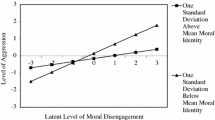Abstract
The present study tested whether Hoffman's conceptualization of the relationship between disciplinary techniques and moral development can account for findings that delinquents score lower than nondelinquents on various measures of moral development. Twenty-six delinquent adolescents, 20 middle class nondelinquents, and 20 lower class non-delinquents were assessed on moral development using the following measures: resistance to temptation, moral stage, feelings after offense, judgment about the severity of punishment, and confession. The use of induction by parents was examined with a Q-sort administered to adolescents and their parents. On most measures of moral development delinquents performed lower than nondelinquents. Less induction was found to be used with delinquents than with nondelinquents. Induction was positively related to most moral measures. It was concluded that disciplinary methods may account for differential moral development of delinquent versus nondelinquent adolescents.
Similar content being viewed by others
References
Blasi, A. (1980). Bridging moral cognition and moral action: A critical review of the literature.Psychol. Bull. 88: 1–45.
Elder, G. H. (1963). Parental power legitimization and its effect on the adolescent.Sociometry 26: 50–66.
Fishman, G. (1979). Patterns of victimization and notification.Brit. J. Criminol. 19: 146–157.
Gold, M. (1966). Undetected delinquent behavior.J. Res. Crim. Delinq. 13: 27–46.
Hoffman, M. L. (1963). Child rearing practices and moral development: Generalizations from empirical research.Child Dev. 34: 295–318.
Hoffman, M. L. (1975a). Sex differences in moral internalization.J. Personal. Soc. Psychol. 32: 720–729.
Hoffman, M. L. (1975b). Moral internalization, parental power, and the nature of parent-child interaction.Dev. Psychol. 11: 228–239.
Hoffman, M. L. (1977). Moral internalization: Current theory and research. In Berkowitz, L. (ed.),Advances in Experimental Social Psychology, Vol. 10, Academic Press, New York.
Hoffman, M. L. (1978). Empathy, its development and prosocial implications. In Keasey, C. B. (ed.),Nebraska Symposium on Motivation, Vol. 25, University of Nebraska Press, Lincoln, Neb.
Hoffman, M. L., and Saltzstein, H. D. (1967). Parent discipline and the child's moral development.J. Personal. Soc. Psychol. 5: 45–57.
Jurkovic, G. J. (1980). The juvenile delinquent as a moral philosopher: A structural-developmental perspective.Psychol. Bull. 88: 709–727.
Katovsky, W., Crandall, V. C., and Good, S. (1967). Parental antecedents of children's beliefs in internal-external control of reinforcements in intellectual achievement situations.Child Dev. 38: 765–776.
Lamb, M. E. (1981) Fathers and child development: An integrative overview. In Lamb, M. E. (ed.),The Father's Role in Child Development, Wiley, New York.
Miller, D. R., and Swanson, G. E. (1960).Inner Conflicts and Defense, Holt, New York.
NCCYD (National Commission for Children and Youths in Distress). (1974).Report to the Prime Minister, Jerusalem, Israel. (Hebrew)
Ruma, E. M., and Mosher, L. (1967). Relationship between moral judgment and guilt in delinquent boys.J. Abnormal Psychol. 72: 122–127.
Sagi, A., and Eisikovits, Z. (1981). Juvenile delinquency and moral development.Crim. Just. Behav. 8: 79–93.
Sagi, A., and Reshef, R. (1981). Degrees of paternal involvement in intact families in Israel: Antecedents and effects. Paper presented at the biennial meeting of the Society for Research in Child Development, Boston.
Saltzstein, H. D. (1978). Social influence and moral development: A perspective on the role of parents and peers. In Lickona, T. (ed.),Moral Development and Behavior: Theory, Research, and Social Issues, Holt, Rinehart and Winston, New York.
Simon, R. (1975). Criminal behavior in women in Israel.Crim. Soc. Deviat. 3: 1–24. (Hebrew)
Winer, B. J. (1971).Statistical Principles in Experimental Design, McGraw-Hill, New York.
Ziv, A. (1976). Measuring aspects of morality.J. Moral Educ. 5: 189–201.
Author information
Authors and Affiliations
Additional information
This research was supported by grant No. 10/B-6 from the Ford Foundation—Israel Foundation Trustees and the School of Social Work Research Committee, University of Haifa.
Received Ph.D. from the University of Minnesota in 1977. Current research interests are juvenile delinquency and residential care.
Received Ph.D. from the University of Michigan in 1976. Current research interst is the role of the father in child development and early social development.
The contribution of the authors is equal.
Rights and permissions
About this article
Cite this article
Eisikovits, Z., Sagi, A. Moral development and discipline encounter in delinquent and nondelinquent adolescents. J Youth Adolescence 11, 217–230 (1982). https://doi.org/10.1007/BF01537468
Received:
Issue Date:
DOI: https://doi.org/10.1007/BF01537468




